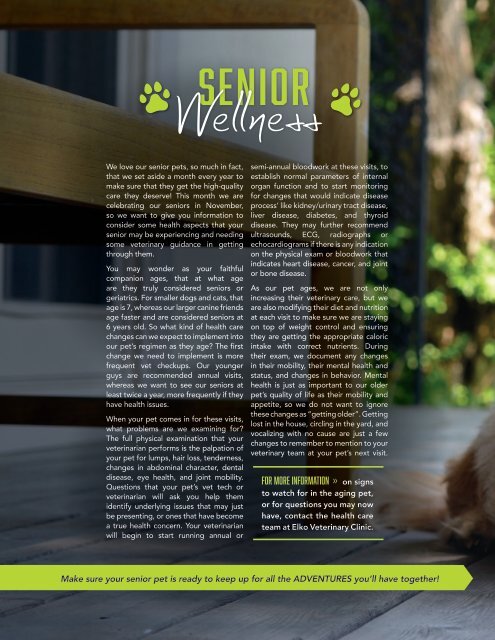Everything Elko November 2018
Create successful ePaper yourself
Turn your PDF publications into a flip-book with our unique Google optimized e-Paper software.
SENIOR<br />
Wellness<br />
We love our senior pets, so much in fact,<br />
that we set aside a month every year to<br />
make sure that they get the high-quality<br />
care they deserve! This month we are<br />
celebrating our seniors in <strong>November</strong>,<br />
so we want to give you information to<br />
consider some health aspects that your<br />
senior may be experiencing and needing<br />
some veterinary guidance in getting<br />
through them.<br />
You may wonder as your faithful<br />
companion ages, that at what age<br />
are they truly considered seniors or<br />
geriatrics. For smaller dogs and cats, that<br />
age is 7, whereas our larger canine friends<br />
age faster and are considered seniors at<br />
6 years old. So what kind of health care<br />
changes can we expect to implement into<br />
our pet’s regimen as they age? The first<br />
change we need to implement is more<br />
frequent vet checkups. Our younger<br />
guys are recommended annual visits,<br />
whereas we want to see our seniors at<br />
least twice a year, more frequently if they<br />
have health issues.<br />
When your pet comes in for these visits,<br />
what problems are we examining for?<br />
The full physical examination that your<br />
veterinarian performs is the palpation of<br />
your pet for lumps, hair loss, tenderness,<br />
changes in abdominal character, dental<br />
disease, eye health, and joint mobility.<br />
Questions that your pet’s vet tech or<br />
veterinarian will ask you help them<br />
identify underlying issues that may just<br />
be presenting, or ones that have become<br />
a true health concern. Your veterinarian<br />
will begin to start running annual or<br />
semi-annual bloodwork at these visits, to<br />
establish normal parameters of internal<br />
organ function and to start monitoring<br />
for changes that would indicate disease<br />
process’ like kidney/urinary tract disease,<br />
liver disease, diabetes, and thyroid<br />
disease. They may further recommend<br />
ultrasounds, ECG, radiographs or<br />
echocardiograms if there is any indication<br />
on the physical exam or bloodwork that<br />
indicates heart disease, cancer, and joint<br />
or bone disease.<br />
As our pet ages, we are not only<br />
increasing their veterinary care, but we<br />
are also modifying their diet and nutrition<br />
at each visit to make sure we are staying<br />
on top of weight control and ensuring<br />
they are getting the appropriate caloric<br />
intake with correct nutrients. During<br />
their exam, we document any changes<br />
in their mobility, their mental health and<br />
status, and changes in behavior. Mental<br />
health is just as important to our older<br />
pet’s quality of life as their mobility and<br />
appetite, so we do not want to ignore<br />
these changes as “getting older”. Getting<br />
lost in the house, circling in the yard, and<br />
vocalizing with no cause are just a few<br />
changes to remember to mention to your<br />
veterinary team at your pet’s next visit.<br />
For more information » on signs<br />
to watch for in the aging pet,<br />
or for questions you may now<br />
have, contact the health care<br />
team at <strong>Elko</strong> Veterinary Clinic.<br />
Make sure your senior pet is ready to keep up for all the ADVENTURES you’ll have together!<br />
64 www.<strong>Everything</strong><strong>Elko</strong>.com | <strong>November</strong> <strong>2018</strong>
















